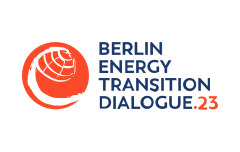Damilola Ogunbiyi: Keynote speech from the Berlin Energy Transition Dialogue
Berlin, Germany - 28 March 2023
Excellencies, Ladies and Gentlemen, thank you so much for having me speak to you again.
I would like to thank the Federal Foreign Office and the Federal Ministry for Economic Affairs and Climate Action for convening this 9th Berlin Energy Transition Dialogue and for inviting me to address you.
I couldn’t put it better than my previous speaker, President William Ruto that there is no transition without Africa, and this notion that the Global North can develop a path to net zero and leave a billion people in energy poverty is unacceptable.
I would also like to thank the Minister of Power, Engr. Abubakar D. Aliyu for his continued drive to show that clean energy isn’t a nice to have but is a way of life for Africa’s largest economy, Nigeria.
Today it is more important than ever to drive forward the global energy transition, in the interest of climate change mitigation, energy security, and economic diversification and development.
We are currently at a time of great uncertainty that has led to a three-dimensional crisis - food, energy, and finance — greatly affecting some of the world’s most vulnerable people, countries, and economies. Pushing millions back into poverty, especially energy poverty.
It is, however, also an opportunity to change how the world perceives the energy transition and energy security.
We are already starting to witness the global energy landscape changing dramatically. For example, renewable energy capacity in the EU is projected to double between 2022 and 2027, this is great!
Similarly, a commitment towards the energy transition is being seen in developing countries too – both in Asia and Africa.
However, it is important to stress that the energy crisis is truly global. Although some of the biggest disruptions have been felt in Europe and the Global North – major impacts are being felt in many emerging and developing economies.
The energy transition in developing countries includes transitioning out of poverty, transitioning towards development, transitioning towards growth, and transitioning sustainably.
Global investment in renewable energy reached a record high in 2022 - at USD 0.5 trillion – but this represented less than 40% of the average investment needed each year between 2021 and 2030 if we are to meet the sustainable development goals and limit global warming to 1.5°C.
More striking than the absolute numbers is that Sub-Saharan Africa received less than 1.5% of the amount invested globally in renewable energy between 2000 and 2020. Nearly 15% of the world’s population only received 1.5% of the global investment in renewable energy.
The disparity in renewable energy financing received by developed versus developing countries has increased significantly over the past six years.
It is for this reason that we need to be creative and develop new approaches, to ensure that we leave no one behind when it comes to the energy transition.
This is why we take a context-specific – country-focused approach. Solutions need to be scalable but they also need to respond to country needs, and global phenomena.
Responding to the global phenomenon of growing demand for high-integrity voluntary market carbon credits, Sustainable Eenergy for All and its partners are developing a mechanism specifically built for African countries to participate in this market.
The Africa Carbon Markets Initiative (ACMI), which we launched this past November at COP27 with eight countries expressing interest – including an endorsement from President Ruto and eight other presidents.
It is important that we see carbon finance emerge as an important source of capital to drive climate ambitions. ACMI has ambitious targets that include:
- Produce 300 million carbon credits annually by 2030, and 1.5 billion credits annually by 2050.
- Unlock 6 billion in revenue by 2030 and over 120 billion by 2050.
- Support 30 million jobs by 2030 and over 110 million jobs by 2050.
It is very important that we drive this initiative, and I am happy that Kenya could potentially be the first country to have its activation plan, that will hopefully be launched in September this year.
Ladies and gentlemen, it is critical that when we develop solutions, we should look at the continent as a continent for green industry.
We have recently launched what we call the Renewable Energy Manufacturing Initiative (REMI) for Africa and Asia, looking at the manufacturing of solar PV, lithium-ion batteries, and electric 2 wheelers.
It is critical to understand that the continent should not be seen as an extractive continent but one that can add value.
In working towards a global energy transition, we need to recognize the differing energy realities in different parts of the world and ensure that energy transition pathways allow for differentiated approaches to common goals.
All governments need to prepare energy transition plans that take into consideration their reality to green growth, these plans are critical policy and investment tools that will deliver affordable, reliable, clean energy while expanding energy services for all.
Many developing countries have demonstrated a willingness to be leaders and equal partners in the energy transition, with countries such as Kenya, Nigeria, Ghana, and Barbados developing world-class whole economy transition plans.
These ETPs are very important, if I can use the example of the Nigeria ETP, which was launched by President Buhari at COP26, showcased the whole economy change that we are asking governments to do, this is not just renewables going to the power sector but what happens to other sectors such as transport, housing, clean cooking and many more; it is a whole economy point of view.
What it also does is give you a price tag of how much everything will cost. In Nigeria for example, it will cost USD 1.9 trillion for Nigeria to reach net-zero by 2060, of which USD 410 billion will be above business as usual spending. These numbers are really important when we use both public and private investments to drive change.
Supporting the ETPs is a great investment opportunity and countries such as Germany who already have such a strong presence with BMZ, GIZ, KfW already investing in Africa, could be great for the transition - offering more collaborative action in a changing global energy market.
I would like to reiterate that for the energy transition to succeed, no one can be left behind.
In closing, we must prioritize diverse thinking, and be fully inclusive, to ensure that the energy transition does not replicate past inequalities, in the interest of women, workers, and entire communities. The energy transition must respond to people’s aspirations and must power economic growth and development.
I look to you as global leaders to lead the way and transform the energy sector, we are committed in the UN and at Sustainable Energy for All to help countries deliver their energy access and energy transition goals.
Thank you so much for listening.


